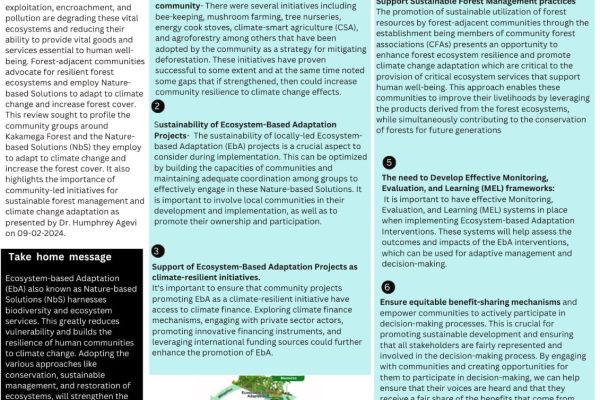Introduction
Community-based circular economy models have the potential to revolutionize food systems by addressing various sustainability challenges and creating resilient and sustainable communities. These models can promote local food production, reduce waste through composting and recycling, and foster community engagement in decision-making processes. These models can support the use of regenerative agricultural practices, such as agroforestry and permaculture, which promote restorative and sustainable food production. By implementing these strategies, communities can reduce their reliance on external food sources, enhance food security, and promote the consumption of locally grown foods. On 01st March 2024, MR. Eldad Kwaku Ackom explored different potential models and strategies that can be adopted in Africa to create sustainable food systems.
Key Messages
Reduction of waste. These models promote the reduction of waste through recycling and composting, and converting organic waste into valuable compost for agriculture. Implementing recycling programs within communities can help divert food packaging and other recyclable materials from ending up in landfills. This, in turn, reduces the overall waste generated from food consumption and supports a circular economy by reintroducing materials back into the production cycle.
Local Food Production. Encouraging communities to produce their food offers numerous advantages and is a fundamental component of sustainable food systems. Small-scale farms, rooftop gardens, and community gardens are places where the practice can be exercised. Communities that grow their food also cut down on long-distance transportation and the greenhouse gas emissions linked to food miles. This has a special effect on Africa, where there may not be as much or as effective transportation infrastructure.
Promoting Sustainable Agricultural Practices. Promoting sustainable agricultural methods such as permaculture, agroforestry, and conservation farming can increase yields and soil health, strengthening the resilience of the food system. By incorporating plants and trees into farming fields, these methods create multifaceted systems with a host of advantages. Trees contribute to increased biodiversity, improved soil structure, and increased water retention, thereby enhancing the food systems’ resilience in Africa.
Market Development. To build resilient and sustainable food systems in Africa, market development is essential. Local communities can build stronger market systems and reap greater economic benefits by establishing local marketplaces and promoting value-added agricultural products. By improving market channels and lowering reliance on centralized distribution networks, the development of local markets enhances the resilience of food systems. Local markets can sustain their operations through periods of crisis, guaranteeing that people can still obtain the necessary nutritional supplies.
Employment Opportunities. In local food systems, a circular economy focused on the community can lead to more employment opportunities. Community-centered circular economy strategies support social and environmental inclusion, and economic stability by emphasizing the creation of employment within local food chains. Besides creating employment, these programs give communities the resources necessary to focus on critical issues regarding climate resiliency, waste management, and food security. To maximize the impact of these initiatives on local economies and scale them up, collaboration is required among government agencies, business enterprises, and local organizations.
Conclusion.
African nations can strive toward developing resilient, equitable, and sustainable food chains that meet the requirements of both the present and the future by implementing these community-based economic models by integrating local production, waste reduction, social inclusion, and sustainable agricultural practices.




